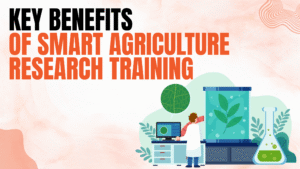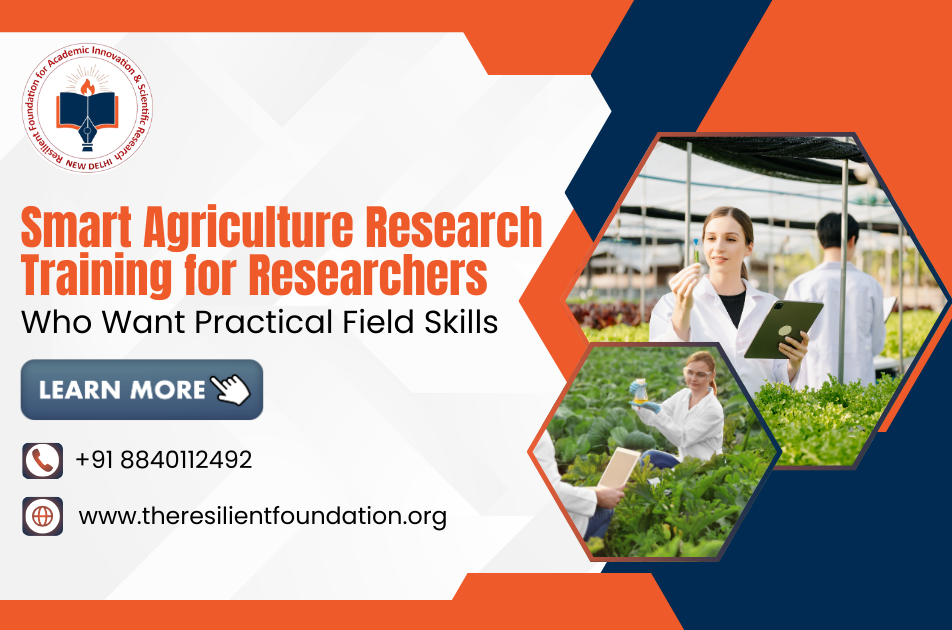Farming today is not simple. It needs new knowledge, tools, and modern ideas to give better crops. Many young people want to work in farming research, but they soon understand that book study is not enough. They need practice in real fields, where they can see crops growing and meet farmers. This is why agriculture research training for researchers is very important. It gives real experience. In training, they can touch the soil, use modern tools, and test ideas. Because of that, they learn skills that build confidence and bring real change to farming.
Importance of Agriculture Research Training for Researchers

The importance of this type of training is very high because it teaches both knowledge and practice. Resilient Foundation works in this area because it helps researchers and builds strong agriculture systems. The points below explain why agriculture research training for researchers is so useful:
- Better Understanding of Crops: Researchers learn how soil, water, and weather affect crops in different seasons. Because of that, they give better solutions.
- Use of Modern Tools: Farming now uses drones, soil devices, and smart data systems. Training also includes agricultural predictive analytics, which helps in better planning.
- Problem-Solving on the Ground: Real fields face problems like pests, crop diseases, or low rain. Training prepares researchers to find quick and simple answers.
- Connecting with Farmers: Researchers learn to speak with farmers, understand their needs, and explain solutions in easy words.
- Focusing on Real-Life Impact: Training is not only about study. It helps farmers improve their farming, earn more, and grow more food.
Key Benefits of Smart Agriculture Research Training

Smart training programs give many benefits to learners. These benefits make them better professionals and also help society.
- Hands-On Experience: Real fieldwork helps researchers test ideas they read in books. They see how agriculture analytics makes results more correct when data is collected properly.
- Exposure to Technology: Training gives practice with apps, sensors, maps, and AI systems. These tools save time and improve accuracy.
- Career Opportunities: After training, researchers become more skilled. Because of that, they are wanted in universities, projects, NGOs, and private firms.
- Building a Network: Training connects learners with experts, farmers, and fellow researchers. This network supports knowledge sharing and future jobs.
- Contribution to Society: With skills from agriculture research training for researchers, learners can help farmers, increase yields, and improve food security.
Skills Researchers Gain Through Field Training
Field training teaches many useful skills that cannot be learned only from books. These skills make researchers ready for real-life challenges.
- Field Data Collection: Researchers practice checking soil health, crop growth, and water use. This supports sustainable agriculture because advice is based on facts.
- Analytical Thinking: Training helps learners study data, find reasons for crop problems, and suggest correct solutions.
- Communication Skills: Training builds the habit of sharing research in simple words so farmers and leaders can understand easily.
- Adaptability: Farming fields always change due to weather, pests, or soil. Training teaches researchers to adjust quickly in any situation.
- Project Management: Many projects are done in groups. Researchers learn teamwork, planning, and time control, which are useful for big agroecology projects.
Frequently Asked Questions (FAQs)
Q1. How does smart training support modern agricultural research?
Smart training mixes book study with field practice, using sensors, apps, and maps. This makes agricultural research more useful and correct for farmers.
Q2. Why is field experience important for young researchers?
Field experience makes learning real. Agriculture research training for researchers gives practical exposure, builds confidence, and helps them understand farming problems directly from farmers.
Why Researchers Should Choose Smart Agriculture Research Programs
Smart programs are special because they mix practical work, skills, and real impact. At Resilient Foundation, the aim is to build researchers who can bring positive change in farming.
- Practical Knowledge First: These programs give more fieldwork than book lessons. This makes learning strong and clear.
- Advanced Technology Training: Smart training covers modern tools like agricultural predictive analytics, which is very important for future jobs.
- Global and Local Relevance: Skills from these programs are useful in small farms and also in big world projects.
- Strong Career Growth: People who finish smart training are respected because they know both theory and practice. Agriculture research training for researchers makes them job-ready.
- Support from Resilient Foundation: The foundation gives expert help, farmer links, and projects. This ensures training is practical and creates real results.

